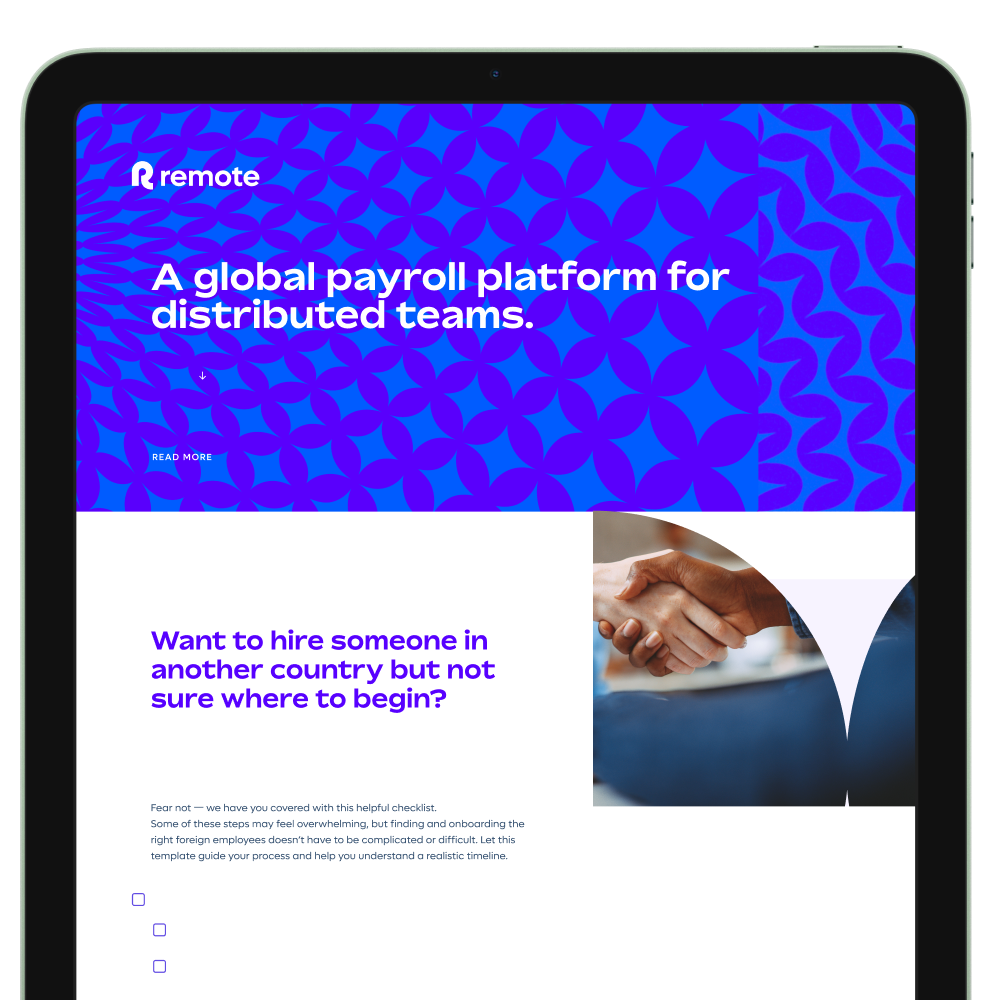
Product Updates — 7 min

Global HR — 11 min
If you employ workers in another country, you may have heard about “permanent establishment” or “permanent establishment risk.” What is permanent establishment, though, and why should businesses with distributed teams care?
“Permanent establishment” is a tax term for businesses that have an ongoing, taxable presence in a country. It’s the same thing as “substance requirement.” In both cases, the question is: are there indicators that your company is established enough in this country to be subject to taxes?
Companies generally try to avoid permanent establishment in countries where they have employees, as permanent establishment obligates the company in question to pay corporate taxes in the country and meet other standards of compliance.
There are several types of permanent establishment that you should be aware of. Your company likely falls under one of them:
A fixed place of business establishment is the most traditional type of permanent establishment. This means having a tangible, fixed, physical business location, such as an office, factory, or workshop.
Even if your company primarily operates remotely, having a physical space in a country counts as a fixed place of permanent establishment.
It’s important to note that a foreign subsidiary doesn’t automatically become a permanent establishment of the parent company. It only does if the subsidiary acts as a dependent agent of the parent company.
In an agency permanent establishment, the business has a dependent agent, employee, or entity working for them in a country.
For example, let’s say a remote company has a sales agent in another country who handles tasks related to closing deals and signing contracts. This would classify it as an agency permanent establishment.
What qualifies as an agency permanent establishment varies across countries, though, so it’s important to research or speak with an expert about local tax laws and international tax treaties to stay compliant.
Businesses working on construction or installation projects in a country can create a construction or project-based permanent setup. If the business activity lasts longer than a certain period based on the country’s tax laws or agreements, it can become a permanent establishment.
Virtual permanent establishment is the same as permanent establishment. The “virtual” part of the name simply refers to the way in which the company establishes its presence in the country.
Establishing a fixed place of business, even if a representative of the company has never physically been to the country, is one of the reasons permanent establishment can be so complex. This is another area in which the laws of different countries treat the situation in different ways.
However, don’t assume that virtual permanent establishment risk is easier to avoid. Countries are becoming more vigilant about the enforcement of permanent establishment laws in the remote work era.
Operations that span borders can still create permanent establishment. As such, remote companies need to understand what permanent establishment’s all about to identify their tax obligations, stay compliant, and manage risks that may impact their business.
Businesses that have permanent establishments in different countries have specific tax obligations. Tax liabilities and double taxation can result. For instance, your company may need to pay taxes on the same income in two different jurisdictions.
Understanding permanent establishment laws keeps your company compliant with international regulations. You’re more prepared to adjust your business to comply with local tax authorities and reporting requirements in the country you operate in. This helps to prevent legal penalties, like fines or sanctions, and allows you to continue doing business in key markets.
Familiarity with permanent establishment helps growing global teams assess and mitigate risks that come with global expansion, such as financial, legal, and operational challenges. It also helps you plan for a more tax-efficient and sustainable international business.
Businesses with no fixed physical location deal with specific permanent establishment challenges. Here are just a few of them:
Figuring out the risks that come with digital work and services, such as selling through an online store, is one hurdle remote companies face. A virtual setup may accidentally lead to a permanent establishment if your company seems like it has a solid business presence in another country.
Each country has unique permanent establishment laws and regulations. It is especially challenging — not to mention time-consuming — for remote companies to understand and adapt to all these rules to remain compliant. Even a small oversight, like misclassifying a remote worker, can lead to big penalties.
What’s the best way to avoid employee misclassification, you might ask? Remote’s misclassification risk calculator can help you check your risk level.
Tax systems and treaties when your employees are scattered all around can get complicated. Getting expert advice or partnering with a professional like Remote, which specializes in international tax law, can help you ensure global compliance and minimize risks.
Permanent establishment works a little differently in different places. Each country has its own criteria to determine whether a business is classified correctly. That said, most countries follow a similar set of guidelines to determine a company’s status. Take a look at these questions to better understand the triggers of permanent establishment:
Does the company have a fixed place of business in the country?
In this case, a fixed address doesn’t necessarily mean a physical address. Certain registrations can qualify as a fixed place of business, as can other business operations, even if the company doesn’t have an office. In the age of remote work, understanding the rules about fixed places of business can be challenging.
Does anyone regularly conduct business as an agent of the company in the country?
In other words, is there someone in the country who exercises decision-making power on behalf of the company? This does not only refer to executives who handle things like partnerships or investments. Salespeople who close deals and sign contracts can also trigger permanent establishment.
How much control does the company exercise over its workers in the country?
This is where things can get tricky. Companies need to be aware of not only the classification of their contractors but also the relationships they have with their employees. Working with an employer of record insulates companies from some of this risk, but businesses should speak with in-country global employment partners to understand their protections against permanent establishment risk.
How does the company generate revenue in the country?
When a business generates revenue in a country, the country usually wants a share of that revenue. Tax treaties determine where companies are obligated to pay taxes, but permanent establishment can change those rules. If employees in the country directly contribute to the company’s ongoing revenue, those activities could create permanent establishment.
How long has the company been doing business in the country?
Permanent establishment is usually not triggered by a representative occasionally traveling to a country to close a deal. However, that does not mean companies can freely conduct business abroad simply because their employees are travelers and not residents. The longer the company does business in the country, the greater the permanent establishment risk becomes, and the more closely authorities will audit the organization.
Does the company make strategic decisions from within the country?
For example, does the board regularly meet in the country? Senior leaders convening could be an indicator of permanent establishment. When hiring C-level executives and board members through an employer of record, locations of board meetings should be top of mind.
Work through this checklist to help you stay compliant when you're employing across borders.

Co-employment and permanent establishment are not the same. Co-employment refers to a situation in which two employers are simultaneously responsible for the same employee. Fortunately, co-employment is not a factor in determining permanent establishment risk.
Working with an employer of record does not directly affect permanent establishment risk, nor does an employer of record relationship necessarily lead to co-employment. As most companies using an employer of record do not have an office in the country, they have some distance from permanent establishment for that reason alone.
Be extremely cautious about employers of record who attempt to circumvent the rules of permanent establishment. If your business is caught operating deliberately out of compliance, you could be subject to substantial fines and penalties, which could even include a ban on doing business in the country. For example, if an employer of record offers to employ your workers in a different country than the one in which they actually work, you could put your company at great risk.
You can avoid permanent establishment risk while still operating under the rules. Working within the system to remain compliant is always preferable to breaking the law and hoping to avoid detection.
Primarily, a company under permanent establishment is required to pay corporate taxes in the country where permanent establishment was created. Other factors may come into play, such as new regulations for companies operating in the country, but permanent establishment is primarily an issue of taxation.
Businesses should be cautious to avoid being taxed twice on the same income in two different countries. In some cases, once permanent establishment is created, it can be difficult to avoid paying double. This is why it is essential to understand and plan for permanent establishment risk from the beginning. When permanent establishment is unavoidable, clear transfer pricing arrangements can help determine which revenue streams are generated in the country.
Businesses with employees in multiple countries must be extra cautious. All countries manage their own permanent establishment criteria and leverage their own taxes, so a company with poor management of permanent establishment risk could end up creating permanent establishments in multiple countries.

The safest way to avoid permanent establishment is to work with a global employment solution that can help you understand the specific laws of the country in question. There is no one-size-fits-all solution to permanent establishment risk.
Permanent establishment assessments are continuously evolving. These assessments are factual, not subjective. Local authorities can update their criteria at any time, so companies cannot implement a one-time fix.
It is always safer to work with a partner with an owned local legal entity in the country instead of a partner who relies on third parties. Employers of record and other global employment solutions providers without owned entities must outsource services to other businesses, and those businesses may not have the expertise or experience necessary to navigate permanent establishment risk. Even if multiple partners can make it more difficult for authorities to determine permanent establishment risk on the surface, it is much easier to remain compliant with a single point of contact and expertise.
See also: Owned-entity vs. partner-dependent global employment
Most importantly, companies should always understand the tax treaties that are in place between their home country and the country where they wish to do business. The best way to stay compliant with tax treaties is either to retain your own in-country legal representation or to work with a global employment solution with an entity in that country.
With dozens of local entities in countries around the world and a commitment to the highest standards of compliance, Remote is your go-to resource for all your global employment needs. We are the experts on permanent establishment in countries around the world and can help your business make the smartest financial decisions as you grow your global team.
Contact us today to learn more about Remote’s employer of record, payroll and benefits, and contractor management solutions. If you’re ready to get started, you can sign up and start employing through the Remote platform right away.
Hire and pay your global team with Remote and get access to our team of global taxation experts.

Subscribe to receive the latest
Remote blog posts and updates in your inbox.

Product Updates — 7 min

Global Payroll — 2 min

Minimum Wage & Compensation — 7 min

Newsroom — 5 min